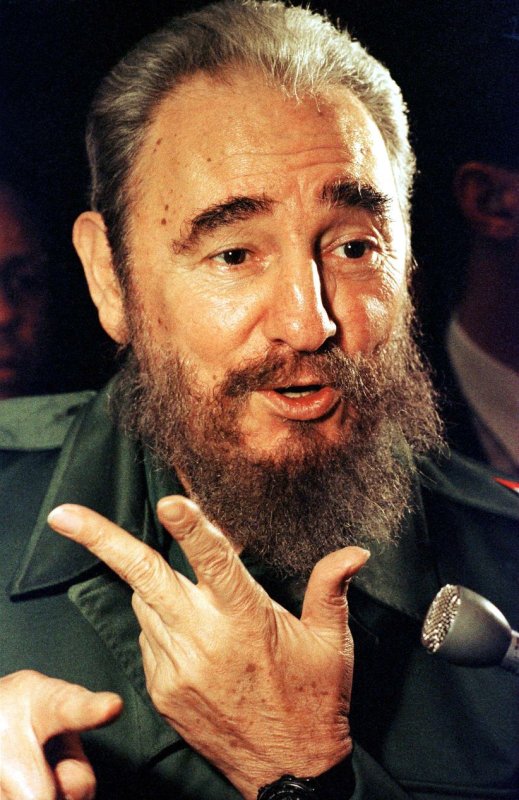1 of 3 | Fidel Castro celebrates his 90th birthday on Saturday, August 13. This photograph was taken on December 14, 1995 in Vancouver, Canada. File Photo by H. Ruckemann/UPI |
License Photo
HAVANA, Aug. 13 (UPI) -- Cuba is celebrating the birth of its Communist leader Fidel Castro with parties and celebrations across the island.
Castro, who turned 90 on Saturday, was honored with parades and dancing. The Cuban Institute of Music is hosting a series of concerts across the country, the Institute said in a press release.
"Over one hundred children's choirs and concert bands will sing in unison, across the country, at cultural institutions, in squares and parks to celebrate with a lot of joy the birthday of Fidel, the father of all Cuba's children," the institute said.
For Castro, the party comes a something of a surprise.
"Soon, I'll be turning 90 years old," Castro said at a meeting of the Communist Party congress in April. "It's something I'd never imagined would happen. It wasn't the fruit of any labour, but rather a whim of destiny. Soon I'll be like all the others; to all of us, our time must come. But the ideas of the Cuban communists will live on."
Castro was born in the town of Birán, the son of a wealthy farmer. Castro's biographers agree that seeing the treatment of Haitian sugarcane workers is what shaped the one-day world leader's ideals.
Castro was sent to study at the Jesuit School of Belen in Havana, and then went on to study law at Havana University.
It was there, embroiled in student politics, that young Castro began to develop his political beliefs.
During a trip to Colombia in 1948 as part of the Latin American youth congress, Colombian leader Jorge Gaitan was assassinated and Castro found himself in the middle of riots and violent protests.
Castro biographer Tad Szulc said this revolt was Castro's "real baptism as a revolutionary," influencing his political strategy.
In 1953 Castro and his supporters unsuccessfully attacked the Moncada barracks in an attempt to overthrow the Cuban government.
In 1959 Castro seized power from Cuban President Fulgencio Batista, and ruled until intestinal issues forced him to transfer his reign to his brother, Raúl in 2008.
During Friday night's carnival-style celebration in Havana, revelers praised Castro and celebrated his leadership.
"This is the best gift we can give him, this party," said 25-year-old Leydis Campos, 25. "To 90 years past, and to 90 more!"
Not all Cubans share in the enthusiasm of the Castro regime.
Seeking to escape Castro's oppressive leadership, millions of refugees sought asylum in other countries. The largest wave occurred in 1980 with over 125,000 Cubans fleeing from the Port of Mariel to the United States over the course of several months.
The start of the Cuban exile came years after the United States' failed takeover in the 1961 Bay of Pigs mission, which left over 100 Americans and Cubans dead.
A 2006 report from Human Rights Watch said many of the same policies enforced by Castro were continued by his brother after Castro fell ill.
"Imprisonment is only one of the many tactics the Cuban government uses to repress
fundamental freedoms," the report noted. "Dissidents who try to express their views are often beaten, arbitrarily arrested, and subjected to public acts of repudiation. The government monitors, intimidates,
and threatens those it perceives as its enemies. It isolates them from their friends and
neighbors and discriminates against their families."















